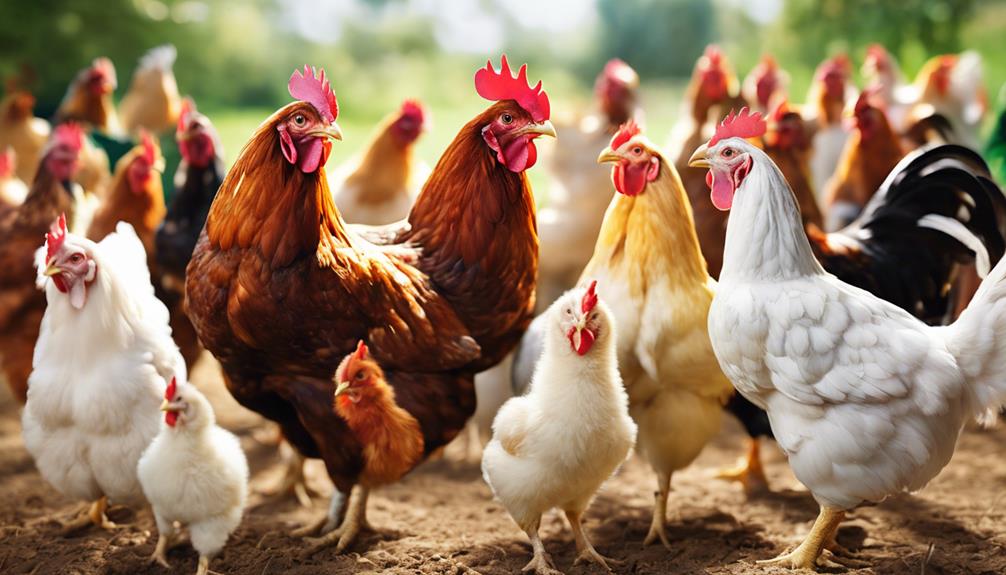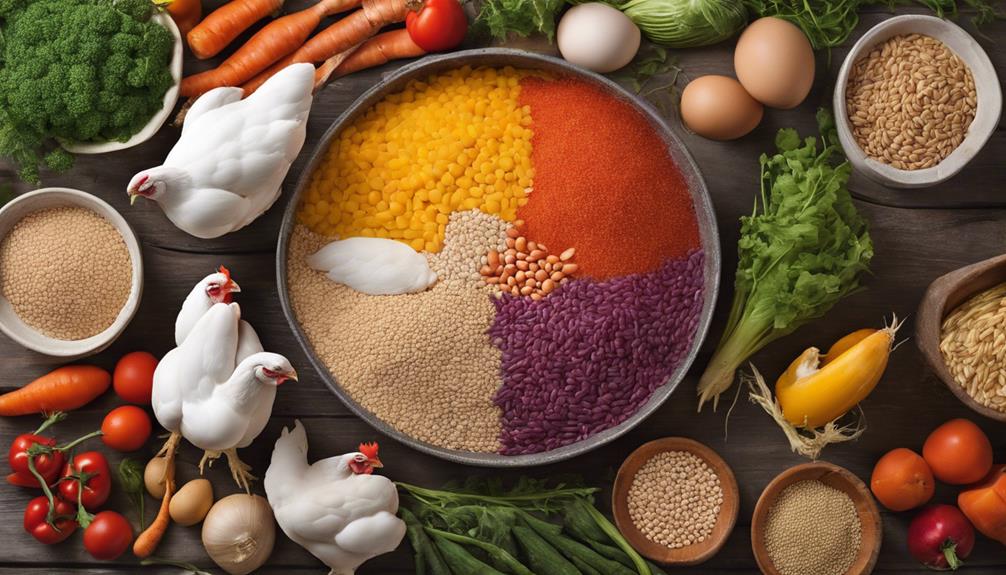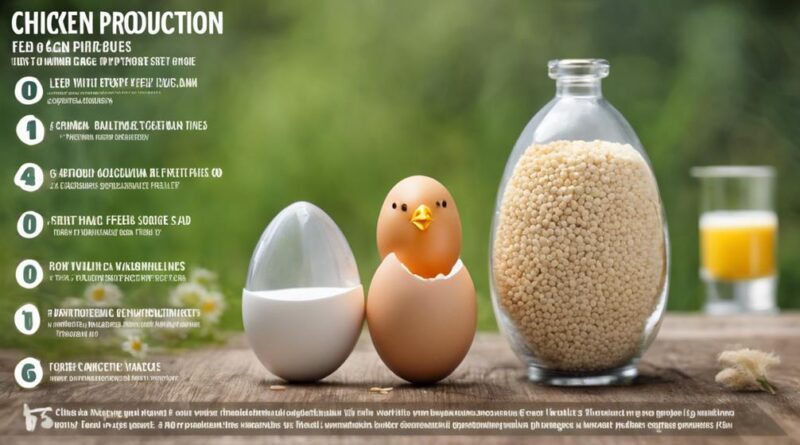Top 10 Tips for Optimal Egg Production Chicken Feed"
For maximum egg production from your chickens, the quality of their feed is key. By focusing on specific nutrients like protein, vitamins, and minerals, you can significantly boost their laying capacity. But that's just the beginning. There are additional crucial factors to consider when it comes to optimizing egg production through their feed. Stay tuned to discover the top 10 tips that will help you fine-tune your chicken feed strategy for optimal results.
Protein-Rich Feed Options
To ensure optimal growth and health for your chickens, prioritize incorporating protein-rich feed options into their diet. Protein is essential for various physiological functions, especially in egg-laying hens. When selecting feed for your chickens, consider the protein content and quality to meet their nutritional requirements. Protein-rich feed not only supports egg production but also helps in maintaining muscle mass and overall health.
When choosing protein-rich feed options, look for those with balanced nutrient ratios. The ideal protein content for laying hens is around 16-18%. However, this can vary depending on the breed, age, and production stage of the chickens. Ensure that the feed you select meets these requirements to support optimal egg production and overall well-being.
Incorporating feed additives can also enhance the protein content of your chickens' diet. Supplements like soybean meal, fish meal, or even insects can be beneficial sources of additional protein. These additives can help boost the overall protein intake of your chickens, especially if their diet is lacking in this essential nutrient.
Essential Vitamins for Layers
For optimal health and egg production in your layers, ensuring they receive adequate essential vitamins is crucial to their overall well-being and performance. Vitamin deficiencies can significantly impact the productivity and health of your flock. To meet their nutritional requirements, layers require specific vitamins in their feed.
Vitamin A is essential for maintaining good vision, promoting growth, and supporting the immune system of your layers. Deficiencies in Vitamin A can lead to poor feather quality and decreased egg production. Vitamin D plays a vital role in calcium absorption, ensuring strong eggshells. Lack of Vitamin D can result in thin or brittle shells, causing egg breakages.
Vitamin E is a powerful antioxidant that helps protect cells from damage, ensuring your layers stay healthy and productive. Vitamin K is necessary for blood clotting and bone health in chickens. B-complex vitamins, including B12, are crucial for metabolism, growth, and energy production.
To prevent vitamin deficiencies, provide your layers with a balanced feed that includes a variety of nutrients. Supplementing their diet with commercial layer feeds fortified with essential vitamins can help meet their nutritional needs. Regularly assess your flock's health and consult with a veterinarian if you suspect any deficiencies. By meeting their vitamin requirements, you can ensure your layers thrive and maintain optimal egg production.
Importance of Calcium Supplement
Calcium supplements are vital for maintaining strong eggshells and overall bone health in your layers. Ensuring that your chickens receive an adequate calcium supplement is crucial for the production of high-quality eggs. Calcium plays a significant role in the formation of eggshells, as well as in maintaining the skeletal structure of your birds.
Calcium absorption is a key process that takes place in the digestive system of your layers. To enhance calcium absorption, it's recommended to provide a separate source of calcium, such as crushed oyster shells or limestone, in addition to their regular feed. This extra source of calcium helps meet the high demands required for eggshell formation.
Eggshell strength is directly correlated to the amount of calcium available to your layers. Without enough calcium, eggshells can become thin and brittle, leading to a higher likelihood of breakage. By incorporating a calcium supplement into your chickens' diet, you can help them produce eggs with strong and durable shells.
To ensure optimal egg production and overall health in your layers, make sure to monitor their calcium intake closely. Providing a balanced diet that includes a sufficient amount of calcium will contribute to the well-being of your chickens and the quality of the eggs they produce.
Balancing Omega-3 and Omega-6
Maintaining a proper balance between Omega-3 and Omega-6 fatty acids is key to optimizing the health and productivity of your chickens. Omega-3 and Omega-6 are essential fatty acids that must be obtained through the diet since chickens can't produce them internally. Omega-3 sources such as flaxseed, chia seeds, and fish oil can be incorporated into the feed to ensure a healthy balance.
Dietary balance is crucial to prevent inflammatory responses and promote overall well-being in your flock. Omega-3 fatty acids are known for their anti-inflammatory properties, which can help reduce stress and boost immune function in chickens. On the other hand, an excess of Omega-6 relative to Omega-3 can lead to pro-inflammatory effects, potentially compromising the health of your birds.
To achieve the optimal Omega-3 to Omega-6 ratio in your chicken feed, consider using a blend of different ingredients rich in these fatty acids. Flaxseed, for example, is an excellent source of Alpha-linolenic acid (ALA), a type of Omega-3 fatty acid. Including a variety of Omega-3 sources in the diet can help maintain a healthy balance and support egg production and overall chicken health.
Organic Feed Benefits
Achieving optimal chicken health and productivity can be facilitated through understanding the benefits of incorporating organic feed into their diet. Organic feed offers various advantages that directly contribute to the well-being of your chickens.
One key benefit is improved nutrient absorption. Organic feeds are often free from artificial additives and pesticides, which can hinder the absorption of essential nutrients in conventional feeds. By providing organic feed to your chickens, you ensure that they're receiving a higher concentration of vital vitamins and minerals that are easily absorbed by their bodies, promoting overall health and egg production.
In addition to enhancing nutrient absorption, organic feed also plays a significant role in supporting digestive health. The ingredients used in organic feeds are typically of higher quality and are less processed compared to conventional feeds. This means that organic feed retains more natural fiber and beneficial bacteria that are essential for maintaining a healthy digestive system in chickens.
A balanced and healthy digestive system not only improves nutrient utilization but also reduces the risk of digestive disorders, ultimately leading to happier and more productive chickens.
Managing Feed Waste
To effectively manage feed waste in your chicken coop, implementing proper storage and feeding practices is essential for maximizing feed utilization and minimizing unnecessary wastage.
Here are some key strategies to help you reduce spillage and improve feed efficiency:
- Proper Feed Storage: Store your chicken feed in airtight containers or bins to prevent exposure to moisture, pests, and contaminants. This will help maintain the quality of the feed and reduce the likelihood of spoilage.
- Regular Feeding Schedule: Establish a consistent feeding routine to avoid overfeeding or underfeeding your chickens. By providing the right amount of feed at the right times, you can ensure that the chickens consume all the feed without leaving behind excess waste.
- Feeders and Drinkers: Invest in high-quality feeders and drinkers that are designed to minimize spillage and waste. Choose feeders with anti-waste features to prevent the chickens from scattering feed around the coop, leading to unnecessary loss.
Role of Lysine in Egg Production

Ensuring a balanced diet rich in lysine is crucial for optimizing egg production in chickens. Lysine is an essential amino acid that plays a vital role in the overall health and productivity of laying hens. One of the key benefits of lysine is its contribution to the synthesis of egg proteins. Including lysine in the diet helps in improving the quality and quantity of eggs produced by the hens.
When considering protein sources for chicken feed, it's important to choose options that are high in lysine content. Soybean meal is a popular choice due to its rich lysine profile, making it a valuable ingredient in poultry diets. Other sources of lysine-rich proteins include fishmeal, spirulina, and various seeds like sesame and sunflower seeds. By incorporating these protein sources into the feed, you can ensure that your chickens receive an adequate amount of lysine to support optimal egg production.
In addition to its role in egg protein synthesis, lysine also aids in enhancing the growth and development of chickens. It's essential for feather development, muscle growth, and overall health maintenance in laying hens. Therefore, by understanding the benefits of lysine and selecting appropriate protein sources, you can effectively support the egg-laying capacity and well-being of your chickens.
Avoiding Excessive Salt Content
When formulating chicken feed, it's important to be mindful of the salt content to prevent potential health issues in your flock. Salt intake control plays a crucial role in maintaining the electrolyte balance necessary for optimal egg production. Here are three essential tips to help you avoid excessive salt content in your chicken feed:
- Understand Recommended Levels: Familiarize yourself with the recommended salt levels for chicken feed. Excessive salt can lead to dehydration and other health problems in your flock. Aim to maintain the salt content within the appropriate range to support your chickens' well-being.
- Use High-Quality Ingredients: Opt for high-quality feed ingredients with natural salt content. By choosing ingredients carefully, you can control the overall salt levels in the feed more effectively. Avoid adding extra salt beyond what's already present in the raw materials.
- Monitor Consumption: Keep track of how much feed your chickens consume daily. By monitoring their intake, you can ensure that they aren't exceeding the recommended salt intake. Adjust the feed composition if necessary to maintain a balanced diet and prevent electrolyte imbalances.
Fermented Feed for Healthier Hens

Consider incorporating fermented feed into your hens' diet to promote better health and overall well-being. Fermentation offers numerous benefits for your chickens. One advantage is that it increases the bioavailability of nutrients in the feed, making it easier for your hens to digest and absorb essential vitamins and minerals. Additionally, fermented feed can help boost your hens' immune system, leading to healthier birds that are more resistant to diseases.
However, there are some drawbacks to consider. Fermented feed can spoil if not stored properly, leading to potential health risks for your hens. It's important to monitor the fermentation process closely to ensure that the feed remains safe for consumption.
There are several methods you can use to ferment feed for your hens. One common approach is the wet fermentation method, where feed is mixed with water and left to ferment for a period of time. Another method is the dry fermentation process, where feed is fermented without the addition of water. Each method has its own set of considerations, so it's essential to choose the one that best fits your needs and resources.
Monitoring Feed Freshness
To maintain optimal nutrition for your hens, regularly check the freshness of their feed to ensure it's safe and beneficial for consumption. Ensuring the feed's freshness is crucial in providing your chickens with the necessary nutrients to support their health and egg production. Here are some practical tips to help you monitor feed freshness effectively:
- Checking Storage: Proper storage is essential to maintain the freshness of chicken feed. Ensure that the feed is stored in a cool, dry place away from direct sunlight. Check for any signs of moisture or pests in the storage area that could compromise the feed's quality.
- Feed Rotation: Implement a first-in, first-out rotation system for your chicken feed to prevent any feed from expiring. Label the feed bags with the purchase date and use them accordingly to prevent feeding your hens with stale or expired feed.
- Visual Inspection: Regularly visually inspect the feed for any signs of mold, discoloration, or unusual odors. If you notice any of these indicators, discard the feed immediately to prevent any health issues for your poultry.
Frequently Asked Questions
How Can I Prevent My Chickens From Getting Bored With Their Feed?
To prevent your chickens from getting bored with their feed, try incorporating enrichment activities like food puzzles.
Rotate their feed options to keep things interesting and consider giving them homemade treats as a special surprise.
What Are the Signs of Nutrient Deficiencies in Laying Hens?
If your laying hens are showing signs of nutrient deficiencies, watch out for symptoms like poor egg quality, reduced egg production, feather loss, or weight loss.
To address this, you should provide a balanced diet rich in essential nutrients, possibly with supplements.
Prevention involves proper feed storage, regular monitoring, and ensuring the feed is fresh.
Managing nutrient deficiencies promptly can help maintain your hens' health and egg production.
Is It Safe to Feed My Chickens Table Scraps as a Supplement?
Feeding table scraps to chickens can pose risks to their health, impacting food safety. A balanced diet is crucial for optimal egg production. Scraps may lack essential nutrients, leading to deficiencies.
It's advisable to provide commercial chicken feed as the primary source of nutrition. Supplement with treats like fruits and veggies in moderation. Always ensure the diet meets their nutritional needs to support healthy egg-laying and overall well-being.
Can Certain Herbs or Supplements Improve Egg Quality?
Certain herbs and dietary supplements can indeed improve egg quality in chickens. Herbal remedies like oregano, garlic, and cinnamon, as well as supplements such as omega-3 fatty acids and probiotics, have been shown to enhance egg production and quality.
These natural additives can provide essential nutrients and support overall health, leading to better eggs from your flock. Consider incorporating these options into your chickens' diet for optimal results.
How Can I Adjust Feed Quantities Based on Seasonal Changes in Egg Production?
To adjust feed quantities based on seasonal changes in egg production, monitor your hens' egg output closely. During peak production seasons, such as spring and summer, increase feed quantities to support the higher demand for nutrients.
In contrast, reduce feed amounts during lower egg production periods like winter. By making these dietary changes in response to seasonal variations, you can optimize egg production and ensure your hens receive the right nutrition throughout the year.
Conclusion
In conclusion, ensuring a protein-rich diet and providing essential vitamins are crucial factors for optimal egg production in chickens. Balancing Omega-3 and Omega-6 fatty acids, offering organic feeds, and monitoring calcium intake also play a significant role. Including lysine-rich ingredients, avoiding excessive salt, and considering fermented feed are additional key considerations. Remember to prioritize feed freshness and quality to support healthy and productive layers.
Implementing these tips will help maximize egg production and overall health in your flock.
